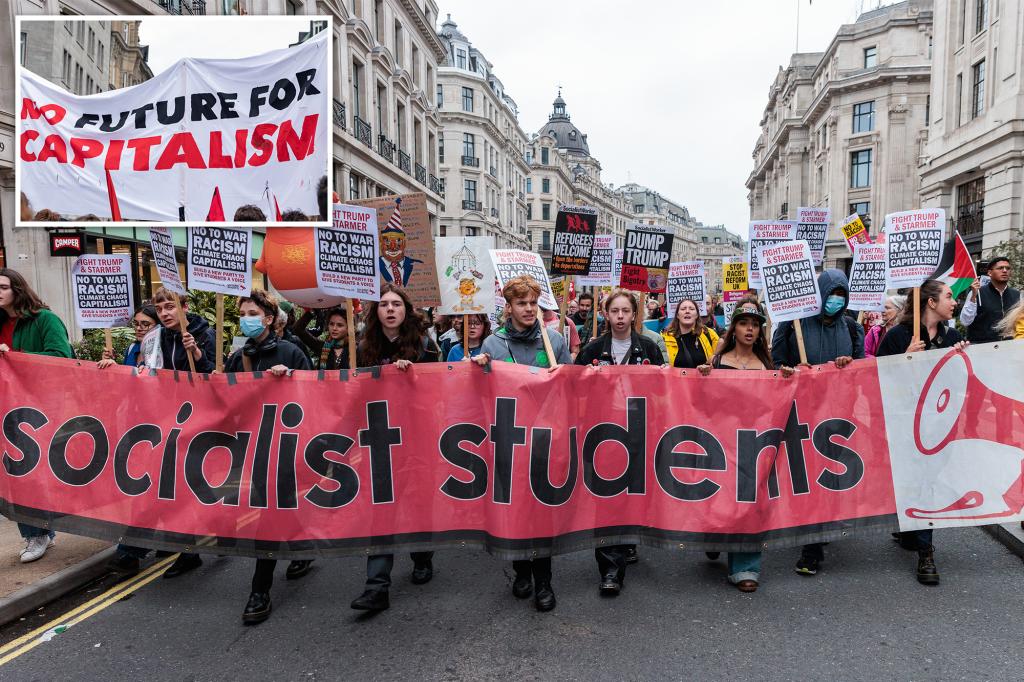Red alert!
A large number of college students prefer socialism to capitalism — with many praising oppressive countries such Cuba over the US, a troubling new poll shows.
The surveyed students were asked whether they agree with the statement, “While socialist countries like Cuba and the Soviet Union have not been perfect, they offer a better economic model than capitalist countries like the United States.”
Nearly half of the undergraduate students surveyed at four-year colleges — or 46% — supported the statement, according to the survey conducted for Yale University’s William F. Buckley Institute.
Thirty-nine percent of students disagreed with the premise, believing capitalism is a superior economic system to government-controlled socialism, while the remaining 15% said they were unsure.
But while the majority praised socialism, not everyone in the lefty group said they’d like to live under such a regime.
“If you had to choose, which economic system would you prefer to live under?” asked the poll conducted by Inquire pollster Rob Schmidt for the Buckley Institute.
Only about 40% slightly preferred to live under capitalism, while 36% said socialism, with a sizable 24% who were unsure.
When it came to students who considered themselves “liberal,” nearly six in 10 — or 58% — agreed that socialism was a better economic model than capitalism, while 63% of conservatives disagreed and chose the free market.
The findings mirror a drop in support for capitalism and a bump for socialism in the overall US adult population, particularly among Democrats.
Nearly 40% of the college students meanwhile said physical violence can be justified to prevent a person from spewing hate — a “disturbing reality’’ amid the murder of conservative icon Charlie Kirk, said the researchers behind the poll.
“It is alarming that a record percentage of undergraduates support shouting down opinions they don’t like. Nearly 40% think violence is justifiable, a disturbing reality coming just weeks after Charlie Kirk’s assassination,” said Buckley Institute founder and Executive Director Lauren Noble.
“It is clear that despite support for free speech in theory, America’s undergraduates don’t support it in practice. America’s colleges and universities still have a lot of work to do,” Noble said.
“While there are things in this poll that give cause for hope, it is clear that American higher education is in trouble.”
The Buckley survey interviewed a representative national sample of 820 undergraduate students online from Sept. 5 to 14 who attend a four-year private or public college or university. The sample is based on those who initially self-selected for participation.
On other issues, the poll found:
- 90% of students support some form of deportation for people who entered the country illegally, including 70% combined who backed removal for those who’ve committed violent crimes or other crimes.
- A majority of students — 61% — oppose transgender athletes competing against biological females in sports because it disadvantages the other athletes.
- Students are split on whether Palestine or Israel is a better ally for the U.S. — 33% said Palestine, 29% said Israel, and 38% were unsure. More liberal students said Palestine is a better ally, while more conservatives said Israel is a better friend.
The survey also found concerns about the capitalist free-market system among college students when it comes to housing.
Seventy percent of the students said they support rent control, including even a majority of conservatives.
Carl Campanile
,
Joseph Barberio
We created two iframe embeds with charts to support this article.
Let me know if these will help.
Story one (Slides 1 & 2)
Story two (Slides 3 & 4)
But the students disagreed by a 47% to 42% margin with the premise of replacing private grocery stores with government-run grocers.
New York City Democratic mayoral nominee Zohran Mamdani has proposed opening five government-run grocery stores throughout the five boroughs, a move he claims will improve access and lower costs.
The survey found that students who identified as liberal were the least tolerant of other students or people with opposing or controversial views.
Overall, 46% of students agreed with the statement that they cannot bring themselves to be close friends with someone from a different political party, while 50% disagreed.
But 64% of liberal students said they could not be chummy with someone with differing views compared with just 35% among moderates and 25% among conservatives who said the same.
Six in ten education majors preparing to become teachers also said they could not be close with someone from a different political party.
Students provided conflicting viewpoints on free speech.
Sixty percent of them said hate speech – no matter how racist or bigoted — is still protected under the First Amendment.
Conversely, nearly half or 48% of students agreed that it is sometimes appropriate to shout down or disrupt a speaker on their campus, while 45% disagreed.
Sixty percent of liberal students said it was OK to shout down or disrupt a speaker compared to only 38% of moderates and 35% of conservatives.
The students were divided on America’s progress on racial equality, too.
They were asked if equality is being extended to more people or if America’s historic link to white supremacy still excludes most minorities from that promise.
The answer: 47% said the country is moving forward, while 48% say the US is still linked linked to white supremacy.
Two-thirds of liberal students and 62% of black students said the country still suffers from entrenched racism.
About two-thirds of the students, or 65%, agreed that their school should require all professors and
administrators to support diversity, equity, and inclusion as a condition of employment.
The program is named after William F. Buckley Jr., a national leader in the conservative movement who founded National Review, was a host on PBS’ “Firing Line” show and ran for New York City mayor in 1965 under the Conservative Party banner.
Read the full article here

